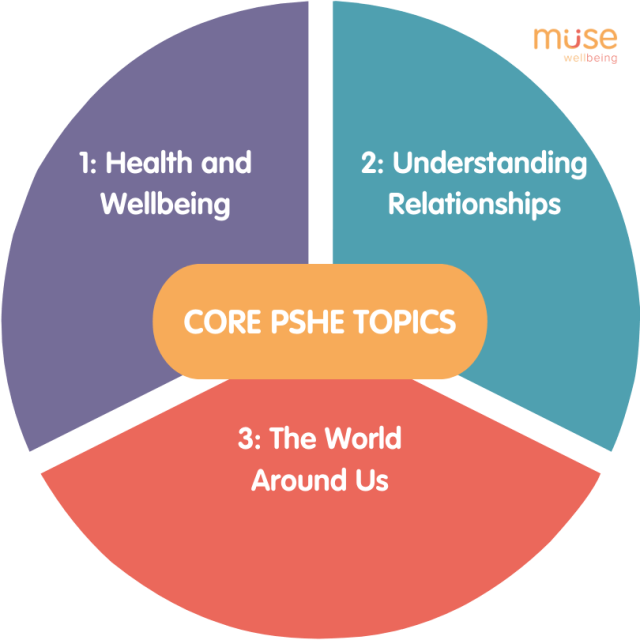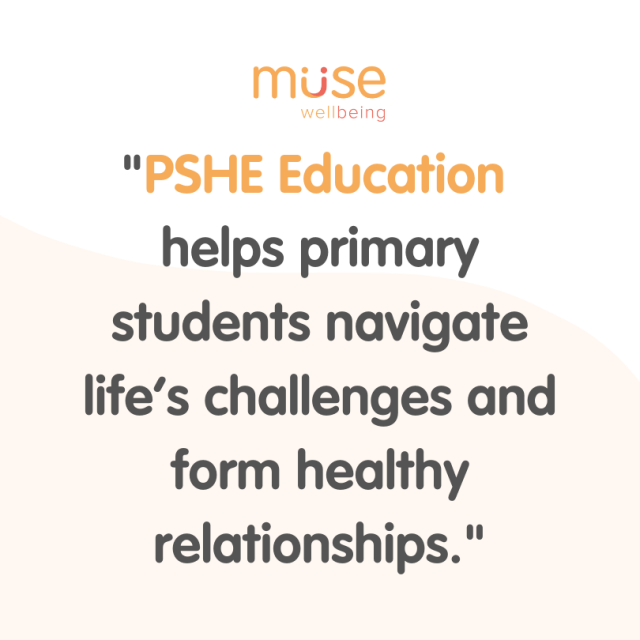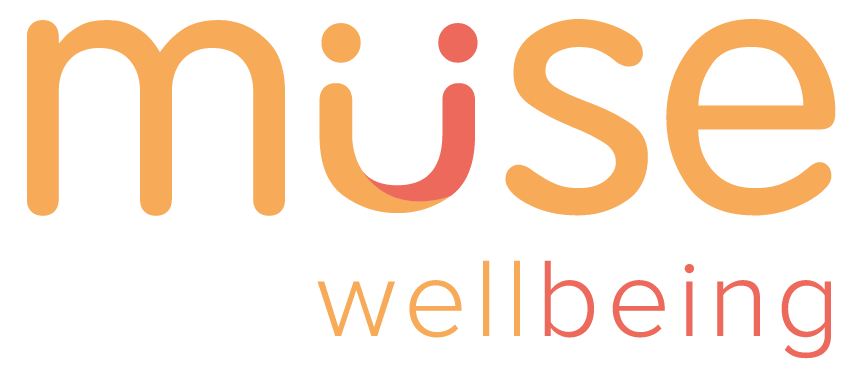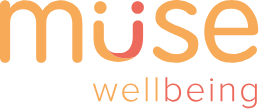PSHE Topics for Primary Schools

David is the Muse Wellbeing director and lead curriculum developer. His Main passions include education, surfing and travelling.

George is an international school teacher based in Asia. A passionate language learner and polyglot, he thrives in diverse classrooms.
PSHE Topics for Primary Schools
Personal, Social, Health and Economic (PSHE) education in primary schools is designed to equip young learners with the skills needed to navigate the complexities of everyday life. Focusing on topics such as health, relationships and personal safety, PSHE learning helps children to develop robustly, in both the social and emotional spheres of development.
These educational themes play a crucial role in building strong foundations, ensuring students have the ability and know-how to make informed decisions and act in the best interests of themselves and others in a multitude of situations. With the right approach, PSHE can help shape primary school students into well-rounded, confident young people prepared for future challenges.
Promoting Health and Wellbeing in Schools
Promoting health and wellbeing forms a fundamental component of PSHE education. With a focus on physical and mental health, schools can help students understand the importance of self-care, nutrition and mental resilience, leading to them taking positive actions in these areas.
According to research from Public Health England, children who participate in health-focused school programmes show improved behaviour and academic performance. The report also shows that students learn about healthy eating, exercise and emotional regulation, which can positively impact all areas of the child’s life. This focus on health and wellbeing is essential for nurturing well-rounded students and, in turn, a supportive and healthy school environment.
What Are the Core PSHE Topics?
The core PSHE topics cover a wide range of essential life skills, providing children with crucial knowledge and actionable methods needed to thrive both in school and in their everyday lives. PSHE lessons at the primary school level are typically divided into three main areas:
- Health and Wellbeing
- Understanding Relationships
- The World Around Us
Each of these areas plays a crucial role in guiding students’ development into responsible, empathetic, and resilient individuals, as outlined in the Muse Wellbeing curriculum.

Furthermore, Relationships Education (RE) and Relationships and Sex Education (RSE) are now compulsory subjects in school. These subjects are usually taught within timetabled PSHE lessons, reinforcing their importance as essential topics of the PSHE curriculum, complementing the other core aspects in developing well-rounded, healthy individuals.
The following are the core components of the PSHE curriculum:
1. Health and Wellbeing
PSHE lessons place significant emphasis on both physical and mental health, teaching students how to cultivate and maintain good habits that benefit their overall wellbeing. Through these lessons, primary school-aged children learn the importance of and actionable methods regarding nutrition, regular exercise and emotional self-care. By learning about such healthy habits at an early age, PSHE classes ensure that students know how to take care of and positively support both their bodies and minds.
2. Understanding Relationships
Developing strong social skills is a core element of PSHE. Lessons focus on helping students build and maintain meaningful, constructive and positive relationships through teaching key concepts such as empathy, kindness and respect. These skills help students to collaborate effectively with others and form positive friendships, fostering a sense of community both inside and outside the classroom.
3. The World Around Us
This area of PSHE focuses on teaching students about global citizenship, their role in the wider community and their own economic wellbeing. Students learn about the importance of being responsible and active members of society, both locally and globally. They explore the impact of their actions on the world, gaining an understanding of sustainability, social responsibility, and how to contribute positively to their communities. Additionally, lessons on economic wellbeing introduce students to the basics of managing money, understanding resources, and the value of personal growth.
These core PSHE topics are essential for fostering responsible, thoughtful and well-prepared students. By addressing health, relationships and safety—especially in primary school—PSHE creates a solid foundation for young students’ personal growth.
Schools do have some flexibility when it comes to the structure of PSHE topics and how they are taught. Schools can tailor lessons to meet their students’ individual unique needs. While health, relationships and safety remain core, schools can adapt the curriculum to incorporate community-specific issues, such as emphasising online safety where internet use among students is significantly high or of particular concern, or adjusting and refining mental health topics according to the age group of the students being taught. Local cultural contexts and timely topics such as environmental responsibility can also be incorporated into classes, making PSHE both impactful and relevant for all learners.
Muse Wellbeing’s PSHE Approach
Muse Wellbeing takes a unique and highly effective approach to delivering PSHE education in primary schools. By incorporating interactive teaching methods such as storytelling, role-playing and group discussions, Muse Wellbeing provides a primary PSHE curriculum that ensures students remain engaged, fully absorb their lessons and take steps to apply the tools and methods learned in their own lives. These hands-on activities help to simplify complex topics to a level that is more accessible and easier for children to understand.
The Muse curriculum focuses on engaging, student-centred learning that encourages active participation in the classroom. Through interactive activities, children not only learn key information and methods for nurturing personal development but also enjoy the process of learning and contributing to the class. The adaptable nature of Muse Wellbeing’s curriculum gives teachers the space to tailor lessons to meet the specific needs of their students, enhancing the learning experience for each child.
Muse Wellbeing places a strong emphasis on supporting emotional health and social skills, recognising that these areas are most critical for student success. By prioritising emotional intelligence, Muse Wellbeing’s curriculum provides students with the tools to manage their emotions, build healthy relationships and work effectively in teams.
Empowering Primary Students Through PSHE
PSHE education empowers primary school students by equipping them with essential life skills that go beyond their academic environment and school community. Through these PSHE topics, students gain a deep and age-appropriate understanding of personal health, relationships and decision-making processes. This curriculum is vital for helping students grow into well-rounded individuals who contribute positively to their communities, both inside and outside the school environment.

PSHE lessons teach children the essential skills to navigate challenges, act responsibly and foster positive relationships. By emphasising the learning of health, social skills and safety, PSHE lessons prepare students for both immediate and future social situations. The skills developed through PSHE—such as recognising and managing negative emotions, forming healthy relationships and staying safe online and in the real world—build the confidence students need to succeed both inside and beyond the classroom.
PSHE Topics for Lifelong Learning
Building a strong framework around key PSHE topics during primary school is essential for fostering responsibility, resilience and empathy in young learners. By covering health, relationships and community understanding, PSHE equips students with the necessary tools for navigating life both in school and the wider world.
Muse Wellbeing’s innovative approach to PSHE education further enhances these foundations by providing teachers with important tools, techniques and lessons that are engaging and relevant to young learners.
Muse Wellbeing
Support
Subscribe for RSHE & Wellbeing Updates & Learning Resources

Copyright © 2025 Muse | All Rights Reserved.
Would you like to logout of Muse Wellbeing?


